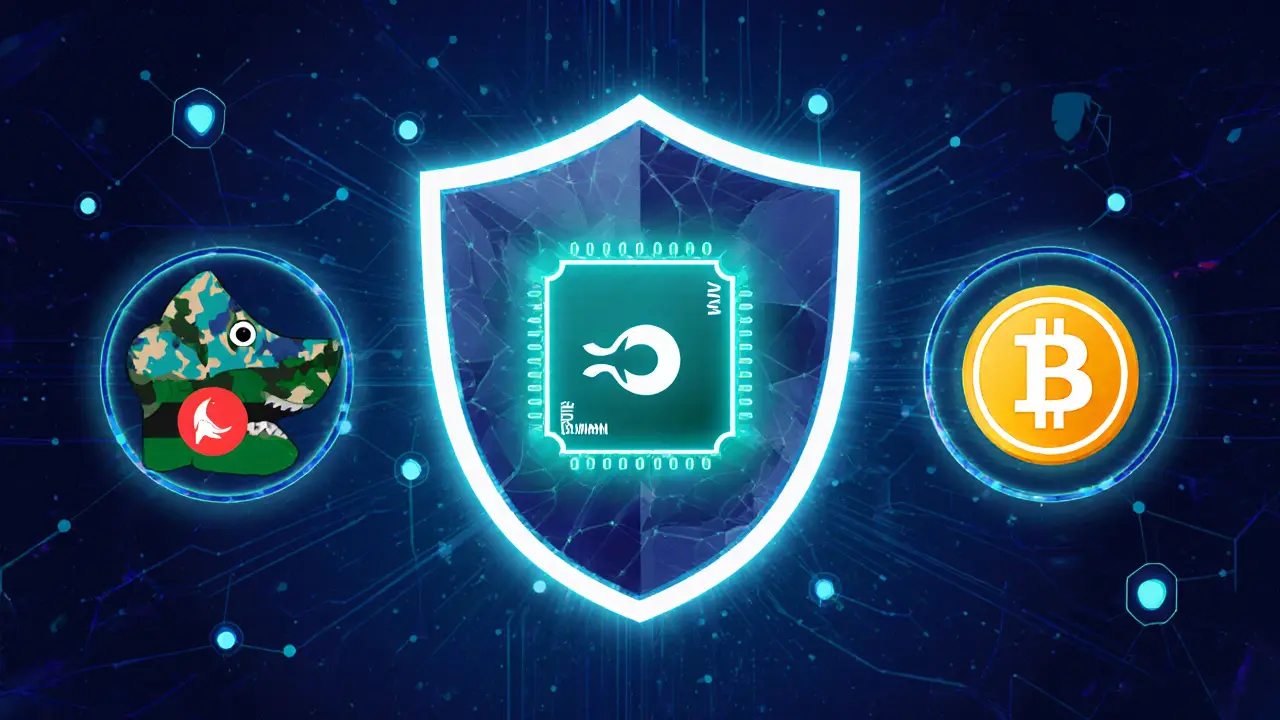Bangladesh Crypto Trading VPN Selector
Recommended VPN Solution
ExpressVPN
Why This VPN Works for You
Key Features Comparison
ExpressVPN
RAM-only servers, private DNS, 30-day money-back guarantee
Surfshark
Unlimited devices, Camouflage Mode, Bangladesh IP access
NordVPN
Malware protection, dark-web monitoring, cryptocurrency payments
When a trader in Dhaka wants to reach a global crypto platform, the first obstacle is often a geo‑block. The Digital Security Act (Bangladesh’s 2018 law that lets authorities monitor online activity) makes any direct connection risky, and exchanges like Binance - one of the world’s biggest crypto markets - openly deny service to Bangladeshi IPs. That’s why a reliable VPN (Virtual Private Network) becomes the gateway for Bangladeshi crypto fans. Below is a practical guide that walks you through choosing, installing, and securing a VPN so you can trade without fearing a block or surveillance.
Why a VPN Is Essential for Bangladeshi Traders
Two forces push the need for a VPN:
- Regulatory pressure. The Digital Security Act grants the government power to sniff traffic, log IP addresses and even seize devices. A VPN encrypts that traffic, making it unreadable to any interceptor.
- Exchange restrictions. Major platforms - Bitfinex, Binance, Kraken, and others - maintain blacklists that include Bangladesh. Without an IP address from an allowed country, the login page simply won’t load.
Beyond legal safety, a VPN gives you the speed and stability needed for real‑time price data, order execution, and low latency arbitrage.
Top VPN Services Recommended for Bangladeshi Crypto Users
Not every VPN meets the dual demands of privacy and fast crypto trading. After testing encryption, server spread, and unblocking consistency, three providers consistently rise to the top:
-
ExpressVPN - praised for RAM‑only servers and private DNS on every node, which makes traffic virtually impossible to intercept. It offers a 30‑day money‑back guarantee for first‑time customers and supports WireGuard for speed.
-
Surfshark - the go‑to choice for getting a Bangladesh IP address, unlimited device connections, and a risk‑free 30‑day refund. Its “Camouflage Mode” hides the fact you’re using a VPN at all.
-
NordVPN - built for crypto traders with built‑in malware protection, dark‑web monitoring, and the ability to pay with cryptocurrency via CoinGate. It runs over 5,400 servers in 118 countries, giving plenty of options for unblocking any exchange.
All three use AES‑256 encryption, the industry‑standard that secures your data against eavesdropping and support the WireGuard protocol for low latency.
How to Choose the Right VPN for Your Trading Style
Consider these attributes before you commit:
- Security features. Look for RAM‑only servers, a kill‑switch, DNS leak protection, and multi‑hop routing.
- Server geography. You need at least one server in a country where your target exchange is fully operational - e.g., United States for Binance US, or Japan for some Asian exchanges.
- Speed and latency. WireGuard or Lightway protocols typically deliver <30ms ping to North America, which is essential for order execution.
- Payment anonymity. If you want to stay off the radar, pick a VPN that accepts crypto payments (NordVPN and ExpressVPN do).
- Price vs. features. Cheaper plans may lack dedicated crypto servers or advanced obfuscation.

Step‑by‑Step: Setting Up a VPN for Crypto Exchanges
Follow these universal steps, then see the quick‑start for ExpressVPN, Surfshark, and NordVPN.
Universal Setup
- Visit the provider’s official website and sign up using an email that isn’t linked to your real identity.
- Choose a payment method - crypto, PayPal, or a prepaid card.
- Download the app for your device (Windows, macOS, Android, iOS) straight from the provider’s site or a trusted app store.
- Install and launch the app. Log in with the credentials you created.
- Select a server located in a country where the exchange works (e.g., United States, Japan, Germany).
- Enable the kill‑switch and DNS leak protection in the settings.
- Open your browser or trading app, clear cache & cookies, then navigate to the exchange’s login page.
- If the site still blocks you, switch to another server in the same region or try a different protocol (WireGuard vs. OpenVPN).
ExpressVPN Quick‑Start
- Sign up at expressvpn.com (use a crypto wallet if you want full anonymity).
- Download the “ExpressVPN” client for your platform.
- In the app, click “Smart Location” and then pick “United States - New York”.
- Turn on “Network Lock” (kill‑switch) and “Trusted Networks” off.
- Visit Binance.com, log in, and trade as usual.
Surfshark Quick‑Start
- Create an account on surfshark.com and select a 2‑year plan for the best rate.
- Install the Surfshark app on all devices you’ll use for trading.
- Enable “Camouflage Mode” in Settings - this hides VPN traffic from deep‑packet inspection.
- Select a server in “Japan - Tokyo” if you’re targeting Japanese exchanges, or “US - Chicago” for Binance.
- Confirm the “Kill Switch” is active, then log into your exchange.
NordVPN Quick‑Start
- Register at nordvpn.com; you can pay with Bitcoin for extra privacy.
- Download the NordVPN application.
- Open the app, choose “Specialty Servers” → “Obfuscated Servers”.
- Pick a server in “Germany - Frankfurt” for a European gateway.
- Enable “CyberSec” (malware & phishing blocker) and the kill‑switch.
- Log into the exchange - you should see a German IP address instead of a Bangladeshi one.
Security Best Practices While Trading Behind a VPN
Even with a VPN, you need to lock down other attack vectors:
- Two‑factor authentication (2FA). Use an authenticator app, not SMS, to avoid SIM‑swap attacks.
- Hardware wallets. Store long‑term holdings offline; never keep private keys on the same device you trade from.
- Secure browsers. Prefer Chrome or Firefox with privacy extensions (uBlock Origin, HTTPS Everywhere).
- Regular updates. Keep your OS, app, and VPN client patched.
- Never reuse passwords. Use a password manager for unique, strong credentials per exchange.
Remember, a VPN masks your IP but does not encrypt the data stored on your device. Combine the tunnel with a strong local security posture for truly private trading.
Troubleshooting Common Access Issues
If you can’t reach the exchange after connecting to a VPN, try these steps:
- Clear cache & cookies. Old session data can still contain a blocked IP.
- Switch servers. Some exchanges detect VPN IP ranges; moving to a different city in the same country often works.
- Change protocol. In the VPN app, toggle between WireGuard, OpenVPN UDP, and Lightway.
- Check DNS leaks. Use https://dnsleaktest.com to ensure your DNS queries are routed through the VPN.
- Contact support. Premium VPN providers usually have live chat that can suggest an unblocked server.
If the exchange still blocks you, it may have upgraded its geo‑filtering. In that case, consider a double‑hop setup (two VPN servers in series) or a dedicated residential IP service.
Future Outlook: VPNs and Crypto in Bangladesh
The cat‑and‑mouse game between regulators, exchanges, and VPN firms is unlikely to stop soon. As the Digital Security Act tightens surveillance, VPN providers are adding more obfuscation and “stealth” protocols to stay ahead. At the same time, larger exchanges are expanding their geographic compliance teams, which could open official access for Bangladesh in the next few years. Until then, a solid VPN remains the safest bridge between Bangladeshi traders and the global crypto market.

Frequently Asked Questions
Is using a VPN legal in Bangladesh?
The law does not forbid VPNs outright, but the Digital Security Act gives authorities the power to monitor encrypted traffic. Using a reputable, no‑logs VPN reduces legal risk, though users should stay aware of any future regulatory changes.
Which VPN offers the fastest connection for live trading?
WireGuard‑based services like ExpressVPN and NordVPN usually deliver the lowest latency, often under 30ms to North America. Test a few nearest servers to find the best real‑time performance for your exchange.
Can I pay for a VPN with cryptocurrency?
Yes. NordVPN, ExpressVPN, and Surfshark all accept Bitcoin, Ethereum, or stablecoins via services like CoinGate, keeping your purchase anonymous.
What should I do if Binance still shows a block after I connect to a VPN?
Clear your browser cache, switch to a different server in the same region, or try a different protocol. If none work, contact the VPN’s support for a fresh IP range that isn’t flagged yet.
Do I need a separate VPN for each device?
Most premium VPNs allow multiple simultaneous connections - ExpressVPN up to 5 devices, Surfshark unlimited, NordVPN up to 6. One subscription covers your phone, laptop, and even a router.


15 Responses
Using a VPN in Bangladesh is not just a convenience, it's a shield against an increasingly intrusive legal environment.
The Digital Security Act gives authorities broad powers to monitor traffic, so encrypting your connection is paramount.
When you connect through a reputable service like ExpressVPN, the traffic is wrapped in AES‑256 encryption which makes it incomprehensible to any third‑party observer.
Moreover, the RAM‑only server architecture guarantees that no logs linger after your session ends, which aligns with the principle of data minimisation.
For traders, latency matters; choosing a provider that supports WireGuard can shave off crucial milliseconds during order execution.
This protocol is both lightweight and secure, offering the sweet spot between speed and privacy.
In practice, I recommend testing a handful of server locations before settling on one, because some routes may be throttled by local ISPs.
A simple ping test to the exchange’s API endpoint can reveal which server gives you the lowest round‑trip time.
Once you have identified a reliable endpoint, lock it in your VPN client and enable the kill‑switch feature so that any accidental disconnect drops the connection instantly.
The kill‑switch prevents your real IP from leaking, which could otherwise expose you to the DSA’s surveillance mechanisms.
It’s also wise to enable DNS leak protection; many VPNs have this built in, but double‑checking your DNS resolver via an online tool can save you unnecessary headaches.
Beyond the technical setup, maintain a habit of regularly updating your VPN app to patch any emerging vulnerabilities.
The threat landscape evolves, and a provider that is diligent about security updates will keep you a step ahead.
For those who trade on multiple exchanges, consider a multi‑hop configuration that routes traffic through two different jurisdictions, adding an extra layer of obfuscation.
While this may add a fraction of a second to latency, the trade‑off in privacy can be well worth it for high‑value transactions.
Finally, remember that a VPN does not make you immune to phishing or social engineering, so continue to apply standard security hygiene on your accounts. That's the holistic approach I follow.
The VPN choice should prioritize RAM‑only servers and a reliable kill switch. This combination satisfies both privacy and regulatory compliance.
Yo, that's a solid walkthrough, especially the part about ping‑testing different nodes.
I also add a quick tip-clear your DNS cache after switching servers, it helps avoid stale routes.
If you’re on a limited budget, Surfshark’s camo mode is pretty decent too.
Just make sure you toggle the kill‑switch every time you connect, otherwise you might leak your real IP.
Overall, definitely worth the extra few minutes of setup.
When we examine the act of encrypting our digital selves, we confront a deeper question about sovereignty in the virtual realm.
The Bangladeshi legal framework, through the Digital Security Act, attempts to assert jurisdiction over bits and bytes, yet the very nature of the Internet resists such confinement.
A VPN becomes a metaphorical passport, allowing the individual to traverse borders that nation‑states wish to seal.
In doing so, it also challenges the notion of a singular, observable identity, fragmenting the self into encrypted packets.
This fragmentation is not merely technical; it is an expression of autonomy against surveillance.
By selecting a service that employs RAM‑only servers, we voluntarily relinquish persistent data stores, echoing the philosophical ideal of impermanence.
Furthermore, the choice of server geography reflects a strategic alignment with jurisdictions that uphold digital freedoms.
Ultimately, the practice of using a VPN is an act of quiet resistance, a reminder that privacy remains a fundamental human right in the digital age.
Wow!!! That was deep 🤯; I totally feel you on the sovereignty thing-it's like breaking chains!!!
But ya gotta remember, even with the best VPNs, sometimes the ISP still tries to sniff… so always check for leaks!!! 😅
Also, don’t forget to update your app; old versions can have bugs!!! 🌐
Sure, because adding a few more layers of encryption will magically make the government care less about your trades.
Let me set the record straight: the crypto market is unforgiving, and any latency above a few milliseconds can erase your profit margins in the blink of an eye.
When you pair that reality with Bangladesh’s draconian Digital Security Act, you are essentially playing chess while the opponent is moving three pieces at once.
The first move is to select a VPN that not only offers AES‑256 encryption but also supports the latest WireGuard or Lightway protocols-these are not optional, they are essential.
Second, you must configure the client to route all traffic, including DNS, through the tunnel; a split‑tunnel setup is a recipe for disaster.
Third, verify that the VPN provider maintains a strict no‑logs policy; any retention can be subpoenaed under local law.
Fourth, employ a multihop configuration, preferably through a jurisdiction with strong privacy statutes, to add an additional veil of anonymity.
Fifth, continually monitor your connection’s health: use a packet loss tester and a jitter monitor before each trading session to ensure the tunnel isn’t degrading.
Sixth, keep your VPN software updated; vendors patch vulnerabilities that could otherwise be exploited by sophisticated state actors.
Seventh, do not store your exchange API keys on the same machine you use for day‑to‑day browsing-segregate your environments.
Eighth, consider using hardware‑based authentication like YubiKeys to further fortify your accounts.
Ninth, always have a backup VPN subscription ready; providers can be blacklisted without warning.
Finally, remember that technology is only part of the equation-maintain operational security habits, avoid phishing, and never share your credentials.
Follow these steps, and you’ll be trading with a level of security that rivals institutional traders.
Your checklist is exhaustive, yet it omits a critical consideration: the jurisdictional data retention policies of the VPN's parent company.
Even if the service advertises a no‑logs stance, the corporate headquarters may be compelled to cooperate with foreign intelligence services.
Therefore, selecting a provider incorporated in a privacy‑centric country like the British Virgin Islands or Switzerland adds an additional legal safeguard.
Great points all around! For anyone feeling overwhelmed, start with the basics: install a trusted VPN, enable the kill‑switch, and test your connection.
From there, you’ll build confidence step by step.
Just remember: speed matters, so pick a server near the exchange.
Absolutely, the incremental approach works wonders-once the fundamentals are solid, you can gradually explore advanced features like split‑tunneling and multi‑hop routing without feeling swamped.
From a cybersecurity architecture perspective, the implementation of end‑to‑end encryption via a VPN encapsulates the OSI model's session and transport layers, thereby abstracting the underlying IP datagrams from passive eavesdroppers.
In the context of Bangladeshi crypto exchanges, this abstraction mitigates the risk vectors associated with DPI (Deep Packet Inspection) employed by ISPs to enforce the Digital Security Act.
Moreover, the entropy introduced by AES‑256 cipher suites, combined with perfect forward secrecy mechanisms inherent to modern key exchange algorithms like Curve25519, ensures that even if a session key were compromised, previous session data remains cryptographically sealed.
The strategic selection of geographically dispersed exit nodes also leverages geo‑redundancy, reducing the probability of a single point of failure and providing latency optimization through proximity to exchange data centers.
However, practitioners must remain vigilant regarding the potential for VPN tunnel fragmentation, which can occur due to NAT traversal issues, leading to inadvertent packet loss or latency spikes detrimental to high‑frequency trading algorithms.
To counteract this, continuous performance monitoring via tools such as iPerf3 and traceroute should be integrated into the operational workflow.
Finally, adherence to a zero‑trust model-whereby each network transaction is authenticated and authorized independently-complements the VPN's cryptographic assurances, forming a comprehensive defense-in-depth posture suitable for the high‑stakes environment of cryptocurrency trading.
That’s an excellent technical deep‑dive; it would be interesting to see real‑world latency benchmarks comparing exit nodes in Singapore versus Europe for Binance latency in Bangladesh.
Listen up, everyone: if you think a VPN alone will protect you, you’re living in a fantasy.
The real threat is social engineering-phishing emails that look legit, fake login pages, and compromised API keys.
No amount of encryption can save you from a user who unknowingly hands over their credentials.
So while you’re fiddling with server locations, also audit your personal security hygiene.
Change passwords regularly, use hardware tokens, and never click dubious links.
Trust me, the drama of a hacked account far outweighs the excitement of a smooth VPN connection.
Exactly! The powers that be want us to focus on the ‘technical’ fixes while they pull the strings behind the curtains, feeding us VPN ads to keep us complacent while they monitor every transaction through back‑doors embedded in the very protocols we trust.